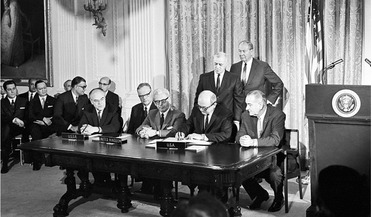 March 2016
Future space is challenge for international law
March 2016
Future space is challenge for international law
... adopted in the 1960s and 1970s. Article VI of the OST only imposes on states parties to the Treaty ‘international responsibility for...that the Moon Agreement is not as popular as the OST and the other space treaties. Consequently its provisions are ...
 April 2019
Is a military space force justified?
April 2019
Is a military space force justified?
... upset the international legal order The Outer Space Treaty (OST) of 1967 is the primary statement of international law ... may become established on the Moon but Article IV of the OST prohibits troops from being stationed, as a military fighting force,...
 June 2019
The challenge of planetary protection
June 2019
The challenge of planetary protection
... by COPUOS in 2017 is important as an indication of the role of the COSPAR Planetary Protection Policy in the compliance of the OST. Major moons of our solar system. COSPAR’s Planetary Protection Policy is based on two rationales: 1. Ensure that the...
 August 2021
AI in space – a legal perspective
August 2021
AI in space – a legal perspective
... regard to the corresponding interests of all other States. In addition, according to Article VI of the Outer Space Treaty (OST), States are internationally responsible for national activities in outer space. Among other consequences, this means that...
 September 2016
Moon or Mars - how logical is NASA’s next step?
September 2016
Moon or Mars - how logical is NASA’s next step?
...-governmental use of outer space - but as speakers at the recent Manfred-Lachs conference in Montreal, Canada, noted, the OST just did not foresee outer space as an area destined for commercial exploitation. The US Space Act is therefore...
 May 2019
Active debris removal faces legal minefield
May 2019
Active debris removal faces legal minefield
..., under the definition of a ‘space object’. The author aligns with the view that Article VIII of the OST gives a clear answer to this question, implying that abandonment cannot exist in outer space and that even...